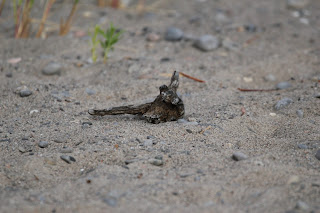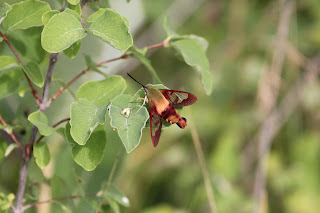 |
| Hwy 401 sunrise |
We got a later start then I'd planned, but we were on the road by ten after four (yes, in the morning). I noted two osprey and a few dozen nighthawks...nope, they were immature gulls. You see, I had nighthawks on the mind, so whenever I saw a dark shape with bent wings in the early morning light, I thought Common Nighthawk. Well...gulls and pigeons disappointed me many times. Heck, even this piece of wood had me fooled!
We arrived around 8:50, and one of the first birds I saw was an Upland Sandpiper. I didn't stop to get a photo, as I thought that we'd see more. I was wrong!
I walked up Wylie Road with the car trailing behind me, looking for birds and bugs. As soon as I stepped out of the car I saw Eastern Kingbirds, Eastern Meadowlarks, Brown Thrasher and a brighter-than-bright Baltimore Oriole. I also found this little vole.
Further up the road, near bluebird box seven, I found a pair of Loggerhead Shrikes! The Loggerhead Shrike is an internationally declining species. There are around 20 pairs in Ontario, with Carden hosting over half of them.
After the Shrikes flew off, I saw another thrasher will a few robins.
Bluebirds aren't the only ones making use of the nesting boxes, this House Wren disappeared into the box after taking the photo.
Barn Swallows lined the fences along the very bumpy road.
I saw many species of sparrows. Grasshopper, Chipping, Clay-colored, Field, and Vesper to name a few.
Eastern Phoebes could be heard and seen throughout.
A really cool bug was this Hummingbird Clearwing Moth.
Next stop, Sedge Wren Marsh! I first walked the trail, where there were some nice wildflowers.
The birds were rather slow on the trail, so I focused on other things.
I really need to watch where I walk. Red Squirrels, Chipmunks, and Piping Plovers (more on that later!), none of them are safe from the size 13 hiking shoes! (Don't worry, no animals became pancakes).
Ebony Jewelwings were the most common ode by far. There were over a dozen in one location alone!
A couple of River Jewelwings could be found with them.
Eyed Brown, Common Wood-Nymphs, and Broad-winged Skippers were around as well.
Both Ruby and White-faced Meadowhawks were around. These two species are next to impossible to separate!
At the end of the trail, a couple of Waxwings were enjoying some berries. One seemed larger than the others, and it turned out, it was just another Cedar Waxwing! No Bohemians today!
I walked down to the bridge, where I was greeted by Viceroy, Pearl Crescent, and a Peck's Skipper.
The bridge is where you most often will see/hear Sedge Wrens. At first, we did not get anything but yellowthroats and Swamp Sparrows.
But soon, we heard the call notes of the wren. About 20 minutes later, it flew right in front of us! No photos, so here's the link to it's All About Birds site: Sedge Wren
This was the first of many Halloween Pennants.
Further down the road there were Red-eyed Vireo, Eastern Wood-Pewee, and Eastern Bluebirds.
On Alvar Road, we found both Midland Painted Turtles and a Blanding's Turtle.
Twelve Spotted Skimmers were in the area as well.
A new butterfly was this Orange Sulphur.
We went down to Prospect Road to have lunch. Black Swallowtails hung out around the flowers.
Ruby Meadowhawks were in the area as well.
There was a weird vocalization that I'm still trying to figure out. I'm pretty sure it wasn't this bird.
Some Northern Crescents were present. Along with a Common Whitetail
This poor Peck's Skipper must not have gotten out of the way in time. A car going very fast had come down the road just a couple minutes before. It was still alive when I picked it up, so I deposited it in some tall grass.
Canal Lake didn't yield any Loons, but we did see 3 Osprey.
Some White-tailed Deer, a doe and a fawn, were nice to see and get some photos of.
Next stop, Cranberry Lake! Or so we thought. The road leading to it is in extremely bad shape. We gave up when we came across a pothole with half a foot of water.
At least I found a Calico Pennant!
Afterwards, it was off to Darlington Provincial Park to see the nesting Piping Plovers.
A large number of Ring-billed Gulls and Caspian Terns were flying around and roosting.
I was getting a bit discouraged about not finding the plovers when I heard a small peep! Not 3 feet in front of me was a juvenile Piping Plover!
Soon, I spotted two more. One adult male and another Juvenile.
I took well over 300 photos, so I'll just let you enjoy a couple. A few of them are already/are going to be published!
A couple photos are on the OFO site:
http://ofo.ca/gallery/current/year/2016/month/7
http://ofo.ca/gallery/checklist/subfamily/23/species/144
They're amazingly camouflaged! Can you spot the Piping Plovers in these shots? (answers at the bottom)
There were two enclosures designed to keep humans and other predators out, which was enclosed by a large roped off area. Almost all of the birds were outside of the roped off areas.
I decided to take a few scenery shots.
Did you notice the dark blob in the last one? I did and went to investigate. It turns out the blob was a female Long-tailed Duck!
Apparently these birds aren't all that rare in summer, but they seldom are close to, let alone on, shore.
One was spotted earlier in Toronto, so perhaps it is the same bird.
My only other shorebird species on the beach were Killdeer and Spotted Sandpiper.
A Red-breasted Merganser and Mute Swan also made an appearance.
And that brings us back to the evil piece of wood...
It was an amazing day of birding in places that I've wanted to visit, and seeing birds that I wanted to see. August is almost here, which can only mean one thing...SHOREBIRDING!
Good birding.
After the Shrikes flew off, I saw another thrasher will a few robins.
Bluebirds aren't the only ones making use of the nesting boxes, this House Wren disappeared into the box after taking the photo.
Barn Swallows lined the fences along the very bumpy road.
I saw many species of sparrows. Grasshopper, Chipping, Clay-colored, Field, and Vesper to name a few.
 |
| Grasshopper Sparrow |
 |
| Vesper |
Eastern Phoebes could be heard and seen throughout.
A really cool bug was this Hummingbird Clearwing Moth.
Next stop, Sedge Wren Marsh! I first walked the trail, where there were some nice wildflowers.
 |
| Oswego Tea |
 |
| Common St.-Johns Wort |
 |
| Bull Thistle |
The birds were rather slow on the trail, so I focused on other things.
I really need to watch where I walk. Red Squirrels, Chipmunks, and Piping Plovers (more on that later!), none of them are safe from the size 13 hiking shoes! (Don't worry, no animals became pancakes).
Ebony Jewelwings were the most common ode by far. There were over a dozen in one location alone!
A couple of River Jewelwings could be found with them.
Eyed Brown, Common Wood-Nymphs, and Broad-winged Skippers were around as well.
 |
| Eyed-Brown |
 |
| Wood-Nymph |
 |
| Broad-winged |
Both Ruby and White-faced Meadowhawks were around. These two species are next to impossible to separate!
At the end of the trail, a couple of Waxwings were enjoying some berries. One seemed larger than the others, and it turned out, it was just another Cedar Waxwing! No Bohemians today!
I walked down to the bridge, where I was greeted by Viceroy, Pearl Crescent, and a Peck's Skipper.
The bridge is where you most often will see/hear Sedge Wrens. At first, we did not get anything but yellowthroats and Swamp Sparrows.
But soon, we heard the call notes of the wren. About 20 minutes later, it flew right in front of us! No photos, so here's the link to it's All About Birds site: Sedge Wren
 |
| There's a Sedge Wren in there...somewhere |
This was the first of many Halloween Pennants.
Further down the road there were Red-eyed Vireo, Eastern Wood-Pewee, and Eastern Bluebirds.
On Alvar Road, we found both Midland Painted Turtles and a Blanding's Turtle.
Twelve Spotted Skimmers were in the area as well.
A new butterfly was this Orange Sulphur.
We went down to Prospect Road to have lunch. Black Swallowtails hung out around the flowers.
Ruby Meadowhawks were in the area as well.
There was a weird vocalization that I'm still trying to figure out. I'm pretty sure it wasn't this bird.
 |
| Yellow Warbler |
Some Northern Crescents were present. Along with a Common Whitetail
This poor Peck's Skipper must not have gotten out of the way in time. A car going very fast had come down the road just a couple minutes before. It was still alive when I picked it up, so I deposited it in some tall grass.
Canal Lake didn't yield any Loons, but we did see 3 Osprey.
Some White-tailed Deer, a doe and a fawn, were nice to see and get some photos of.
Next stop, Cranberry Lake! Or so we thought. The road leading to it is in extremely bad shape. We gave up when we came across a pothole with half a foot of water.
At least I found a Calico Pennant!
Afterwards, it was off to Darlington Provincial Park to see the nesting Piping Plovers.
A large number of Ring-billed Gulls and Caspian Terns were flying around and roosting.
 |
| Cross-legged Gull |
I was getting a bit discouraged about not finding the plovers when I heard a small peep! Not 3 feet in front of me was a juvenile Piping Plover!
Soon, I spotted two more. One adult male and another Juvenile.
I took well over 300 photos, so I'll just let you enjoy a couple. A few of them are already/are going to be published!
A couple photos are on the OFO site:
http://ofo.ca/gallery/current/year/2016/month/7
http://ofo.ca/gallery/checklist/subfamily/23/species/144
They're amazingly camouflaged! Can you spot the Piping Plovers in these shots? (answers at the bottom)
 |
| There are 2 in this one |
 |
| Can you find all 3? |
There were two enclosures designed to keep humans and other predators out, which was enclosed by a large roped off area. Almost all of the birds were outside of the roped off areas.
 |
| "Watch your feet"...good advice! |
I decided to take a few scenery shots.
Did you notice the dark blob in the last one? I did and went to investigate. It turns out the blob was a female Long-tailed Duck!
Apparently these birds aren't all that rare in summer, but they seldom are close to, let alone on, shore.
One was spotted earlier in Toronto, so perhaps it is the same bird.
My only other shorebird species on the beach were Killdeer and Spotted Sandpiper.
A Red-breasted Merganser and Mute Swan also made an appearance.
And that brings us back to the evil piece of wood...
It was an amazing day of birding in places that I've wanted to visit, and seeing birds that I wanted to see. August is almost here, which can only mean one thing...SHOREBIRDING!
 |
| Hwy 401 sunset |
Good birding.
********
Find the Plover Answers:






































































That LBJ you saw is a Vesper if I've ever seen one...which I haven't, but I certainly think the red shoulder patch gives it away, as well as the face pattern. From everything I've ever seen, read, and heard about Vesper Sparrows it definitely screams Vesper.
ReplyDeleteI have to agree with you on that one! I was thinking that it could possibly be a Vesper, but I wasn't sure, so I didn't call it. Thanks!
ReplyDelete